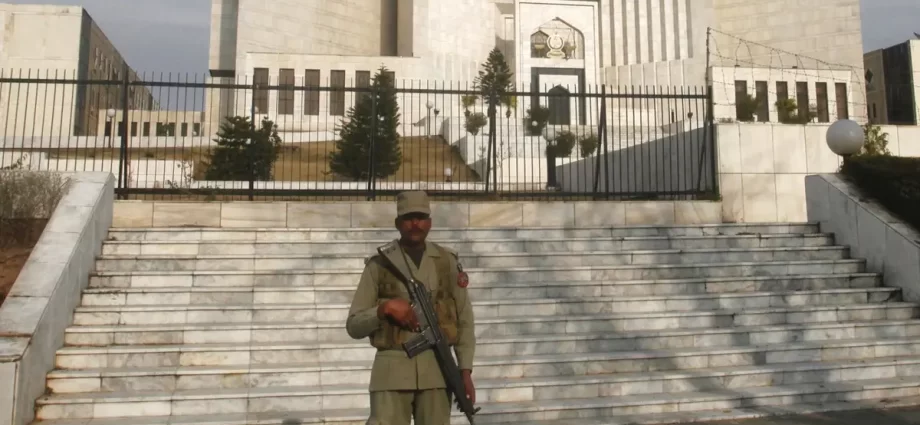The seven-member bench of the apex court dissolved after Justice Mansoor Ali Shah recused himself from hearing over the reservations raised by the federal government.
The bench headed by Chief Justice Umar Ata Bandial, comprises of Justice Ijazul Ahsan, Justice Munib Akhtar, Justice Yahya Afridi, Justice Mazahir Ali Akbar Naqvi and Justice Ayisha Malik.
“Why don’t you amend your petition, you have made several pleas in your petition,” CJP Bandial said. “I will emphasize only on the plea with regard to military courts,” Hamid Khan said. “We will look into the matter later,” CJP replied. “We are getting out of a setback, different ploys being exercised instead of the constitution or law in the case, these practices will serve no good,” he further remarked.
The counsel of former chief justice Jawad S. Khawaja submitted his written contentions in the court.
Petitioner Junaid Razzaque’s lawyer, Salman Akram Raja in his arguments said that the matter of his client’s son has been in military court. “Only a judge posted under Article 175 could conduct trial,” the counsel said.
“The FPLE case decision says that the principle of the division of powers was not clear,” lawyer said. “How the FPLE matter related with this case,” Justice Ayisha Malik questioned. “I will repeat my earlier question that how the section 2 of the Army Act applied,” the Justice Malik asked.
“Even the court martial of the armed forces officers could not be conducted in military courts,” Justice Munib Akhtar asked. “In the UK and US military officers’ trials conducted in military courts in specific conditions,” lawyer replied.
“Why a constitutional petition related to military courts could not be filed in a high court,” Justice Munib asked. “The high court could not determine the position of military courts,” Slman Akram Raja said.
“Are you arguing that even the military officials court martial could not be conducted,” Justice Munib Akhtar questioned. “There is no division of the civilian and military officers in the constitution,” lawyer Salman Akram Raja said.
“Whether trial of anyone started. It is a hypothesis that when they will begin it should happen this or that way,” CJP said. “No trial of any person yet conducted in military courts,” the counsel replied.
“Your case should be set in that manner that civilians rights should not be curbed,” CJP said. “The case should not be led to further complications,” he added.
Counsel Salman Akram Raja further argued that the case can be conducted in a special court if the trial not affecting constitutional rights. “Trial in banking court or ATC have no impact over the constitutional rights,” he said.
“You are linking clause 3 of Article 175 with basic human rights,” CJP remarked. “It will thus applicable over the military courts,” chief justice said.
“Clause 3 of Article 175 becomes effective with fair trial guarantees under Article 9 and 10,” counsel said. “No person can be deprived of the right of transparent trial,” he added.
“Show us a court reference, how Article 175 attaching with the Military Act,” CJP asked.
Justice Ayisha Malik said that FBLE case was linked with the retired soldiers’ relation with the military, it has no relevance with this matter. ” You tell the court that the trial of a civilian can be conducted in military court. You have challenged clauses of the Army Act without providing reasons,” Justice Malik further said.
“The Supreme Court has set the principle that judicial matters can be run by the judiciary,” Salman Akram Raja said.
“There are various decisions with regard to military court, what you are talking about supports military men, we are simple people tell use in simple words,” chief justice said.
“I am only talking on the civilians’ trial in military courts,” the lawyer said. “Then tell us if civilians can be denied of their fundamental rights,” CJP asked. “No one can be denied of fair trial only leveling an allegation,” lawyer said.
“You are saying military courts are a parallel system that could not be termed as court,” Justice Mazahir Naqvi said. “Yes I am saying this as their civilians were not allowed basic rights,” the counsel replied.
“Under the Army Act, military courts conduct trial for breach of discipline. Civilian’s trial in military court is not an issue of discipline violation,” Advocate Raja said.
“It is a good point, are you only challenging the trial of civilian. Are you not challenging the trial of army official,” Justice Ijazul Ahsan questioned. “No, I am not challenging trial of the army officials,” the counsel replied.
The court adjourned hearing of the case for a brief interval.

